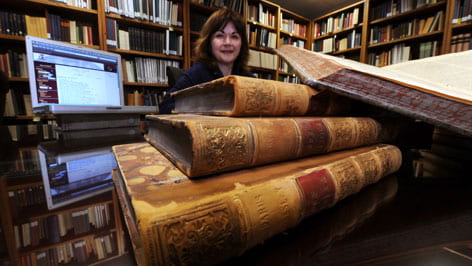Greek classics go digital
The oldest-surviving Greek texts are never more than a few mouse clicks away thanks to the world’s first digital humanities archive, built and maintained at UC Irvine.

The oldest-surviving Greek texts are never more than a few mouse clicks away thanks to the world’s first digital humanities archive, built and maintained at UC Irvine.
“Greek writing recorded the birth and development of Western civilization,” says Maria Pantelia, UCI classics professor and Thesaurus Linguae Graecae project director. “We have gained much of our knowledge of the ancient world by preserving and analyzing these texts. With the help of TLG, students and scholars worldwide are studying Greek authors such as Homer and Plato in ways that were unimaginable just a few decades ago.”
The Thesaurus Linguae Graecae, or Treasury of the Greek Language, is an online anthology of virtually all surviving Greek texts from 800 B.C. to 600 A.D., as well as the majority of existent works up to the fall of Byzantium in 1453. The goal of the project is to digitize all Greek literature.
Since its creation, TLG has inspired new research and enabled discoveries that once were difficult or impossible because of the volume of writing involved. For instance, a researcher at the University of Lausanne in Switzerland scanned TLG 1,200 times to learn about a group of medieval manuscripts in the Vatican Library.
She achieved in less than eight weeks what previously would have taken several lifetimes.
Working with classics professor Theodore F. Brunner, founding donor Marianne McDonald, a former UCI doctoral student who now is a professor of theater & classics at UC San Diego, proposed creation of the computerized databank and launched the project in 1972 with a $1 million gift. Blending classical scholarship with rapidly emerging computer technology was a revolutionary idea. At that time, no standard method existed for digitizing written texts.
David W. Packard – son of Hewlett-Packard co-founder David Packard – led a team that customized a hardware and software system called Ibycus to process, store and search through the archived Greek works.
Packard also wrote the code making it possible to turn the 24 letters of the Greek alphabet into computer-readable text based on the English alphabet. A system he later developed, called Beta Code, remains the most practical way to electronically convert Greek characters.
The digital archive became available on CD-ROM in 1986, after Packard designed a microcomputer specifically to read TLG discs. It was the first time the larger storage capacity of a CD-ROM had been used for data other than music.
“Scholars literally could carry a whole library in their pockets,” Pantelia says.
TLG now has an exclusively Web-based format that allows instant access to any subscriber through the Internet. The site gets more than 10 million hits a year.
The self-sustaining archive has more than 2,000 paid subscribers, including individuals, academic institutions and governments. The project has received major financial support from the David and Lucile Packard Foundation, the University of California, the National Endowment for the Humanities and The Andrew W. Mellon Foundation, among other sources. The governments of Greece and Spain and the Greek-American community also have provided substantial support.
One of the largest collections of electronic text in the world, TLG is used in such varied disciplines as archaeology, art, classics, history, philosophy and religious studies. Subscribers typically access the digital library to reference original Greek texts and study word origins and usage.
Today the archive includes:
- Writings from about 4,000 authors
- 15,000 to 20,000 works
- Almost 100 million words
- About 1 gigabyte of text-only data – 65 times more than in the entire 2,096-page New Oxford American Dictionary
“Every new generation of digital technologies brings enhanced possibilities for exploring the ancient world,” Pantelia says. “I can easily imagine the next 38 years of growth and exciting work for TLG. There is no end in sight.”